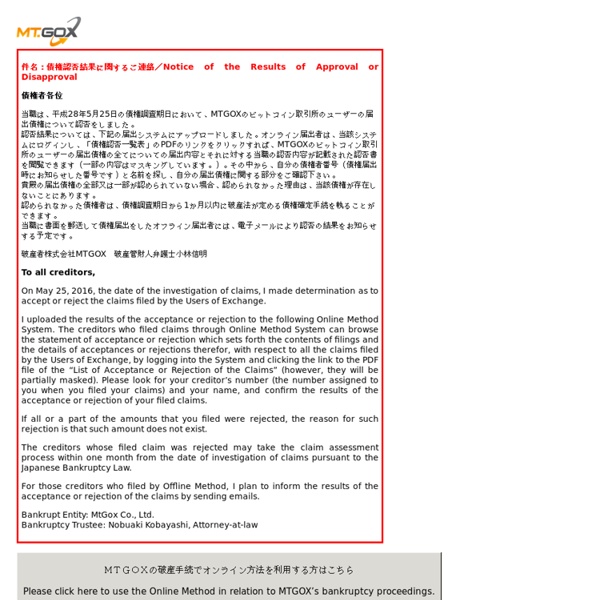



Bitcoin Block Explorer - Blockchain.info WalletBuy & Sell Crypto ExchangeProfessional Trading ExplorerLive Data, Charts & Transactions China's Google Is Now Accepting Bitcoin China's largest search service, Baidu, announced it would now accept bitcoin for its Jaisule service from the 14th of October. Jaisule is the firm's firewall and DDOS protection service. The service essentially protects websites from malicious attacks that attempt to crash it by overloading it with external communications requests so that it cannot respond to legitimate traffic. A similar US-based service is Cloudflare. With a market cap of over $50 billion, the company may be the largest one yet to accept payments in bitcoin. Mt. Gox Mt. Gox was a bitcoin exchange based in Tokyo, Japan. It was launched in July 2010, and by 2013 was handling 70% of all bitcoin transactions.[1] In February 2014, the Mt. Gox company suspended trading, closed its website and exchange service, and filed for a form of bankruptcy protection from creditors called minji saisei, or civil rehabilitation, to allow courts to seek a buyer.[2][3] In April 2014, the company began liquidation proceedings.[4] It announced that around 850,000 bitcoins belonging to customers and the company were missing and likely stolen, an amount valued at more than $450 million at the time.[5][6] Although 200,000 bitcoins have since been "found", the reason(s) for the disappearance—theft, fraud, mismanagement, or a combination of these—were initially unclear.
How the Bitcoin protocol actually works Many thousands of articles have been written purporting to explain Bitcoin, the online, peer-to-peer currency. Most of those articles give a hand-wavy account of the underlying cryptographic protocol, omitting many details. Even those articles which delve deeper often gloss over crucial points. My aim in this post is to explain the major ideas behind the Bitcoin protocol in a clear, easily comprehensible way. We’ll start from first principles, build up to a broad theoretical understanding of how the protocol works, and then dig down into the nitty-gritty, examining the raw data in a Bitcoin transaction.
Bitcoin: More Important Than You Realize Neal Stephenson’s novel The Diamond Age takes place in a future where encrypted currencies and e-commerce have moved most economic transactions into “darknets” beyond government’s capability of monitoring and regulation, causing tax bases around the world to implode and bringing on the collapse of most nation-states. Encrypted currencies and darknet economies have been promoted by such thinkers as David de Ugarte and John Robb as a real-world model for resilient communities in the impending age of hollow states. So you can imagine my reaction to recent news of Bitcoin, “a Peer-to-Peer Electronic Cash System.” Jason Calacanis and his colleagues at LAUNCH describe Bitcoin as “The Most Dangerous Project We’ve Ever Seen” (May 15, 2011). Not only is it “the most dangerous open-source project ever created,” but “possibly the most dangerous technological project since the Internet itself.” The beauty of Bitcoin is that there’s no central server network to shut down.
U.S. Government Seizes LibertyReserve.com Indictment, arrest of virtual currency founder targets alleged “financial hub of the cybercrime world.” U.S. federal law enforcement agencies on Tuesday announced the closure and seizure of Liberty Reserve, an online, virtual currency that the U.S. government alleges acted as “a financial hub of the cyber-crime world” and processed more more than $6 billion in criminal proceeds over the past seven years. After being unreachable for four days, Libertyreserve.com now includes this seizure notice. The news comes four days after libertyreserve.com inexplicably went offline and newspapers in Costa Rica began reporting the arrest in Spain of the company’s founder Arthur Budovsky, 39-year-old Ukrainian native who moved to Costa Rica to start the business. According to an indictment (PDF) filed in the U.S. The U.S. government alleges that Liberty Reserve processed more than 12 million financial transactions annually, with a combined value of more than $1.4 billion.
Bitcoin Mining Hardware - ASIC Bitcoin Miner - Butterfly Labs the bitcoin bank - Bitcoin Bank - Access Bitcoins from Anywhere Liberty Reserve Founder Indicted on $6 Billion Money-Laundering Charges The founder of digital currency system Liberty Reserve has been indicted in the United States along with six other people in a $6 billion money-laundering scheme, in what authorities are calling the largest international money-laundering case ever prosecuted, according to documents unsealed today. Dubbed the “financial hub of the cyber-crime world,” authorities say Liberty Reserve had more than 1 million users worldwide and processed more than 12 million transactions annually as the favored money-laundering service for carders, hackers and other cybercriminals in the digital underground who used it to transfer money around the world effortlessly and anonymously. According to the indictment (.pdf), Liberty Reserve was used to launder more than $6 billion in criminal proceeds. Arthur Budovsky, a Costa Rican citizen of Ukrainian origin, and the founder of the currency system, was arrested in Spain last Friday, while others were arrested in Costa Rica and New York. Go Back to Top.